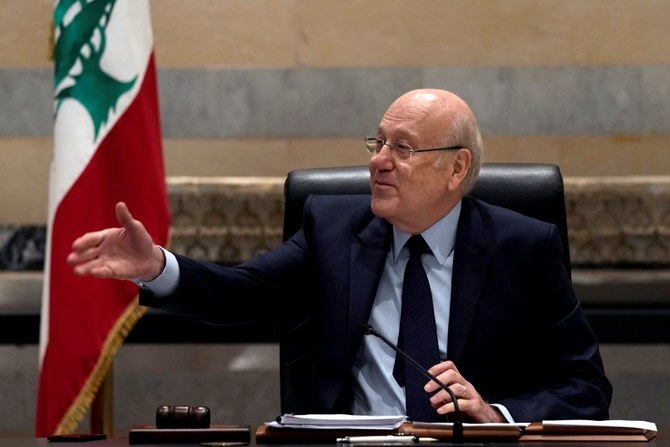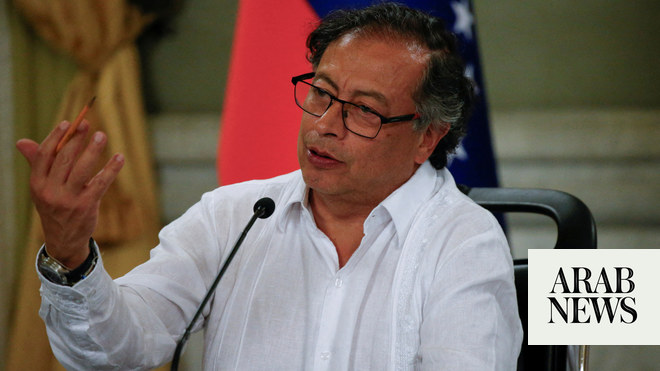
Southern front sees further escalation as more than 50 villages directly affected
On Friday, more residents fled their homes in southern Lebanon when Israeli bombing targeted the area
BEIRUT: Lebanon is ready to implement a UN resolution that would help end Hezbollah’s cross-border attacks on Israel if Tel Aviv also complies and withdraws from occupied territory, Lebanon’s Prime Minister Najib Mikati said on Friday.
His remarks came as Hezbollah intensified its operations against Israeli military sites amid the heated confrontation on the southern Lebanese front.
UN Security Council Resolution 1701, which ended a 2006 war between Israel and Hezbollah, called for the removal of armed personnel south of Lebanon’s Litani River, except for UN peacekeepers and the Lebanese security forces.
The solution to the latest cross-border hostilities “is the implementation of international resolutions,” including Resolution 1701, Mikati said in his statement.
“We are ready to commit to their implementation, on the condition the Israeli side does the same and withdraws — according to the international laws and resolutions — from occupied territory,” he added.
On Friday, more residents fled their homes in southern Lebanon when Israeli bombing targeted the area.
The UN Development Programme this week published a report providing a preliminary analysis of the impact of the Gaza war on Lebanon and the repercussions of the hostilities in southern Lebanon on the local economy as of Dec. 6.
The report said: “As per the National Council for Scientific Research, or CNRS, 91 towns in Nabatieh and southern Lebanon have faced 1,768 Israeli attacks, including 1,564 airstrikes, 90 incendiary bombs, 62 phosphorus shells, as well as other types of attacks, causing casualties and the displacement of 64,000 civilians scattered across 10 districts.”
The hostilities have directly affected more than 50 villages across four districts — Tyre, Bint Jbeil, Marjayoun and Hasbaya — and destroyed assets and infrastructure, as well as disrupted economic and social services.
Regions that were directly affected by bombing and displacement include all the border villages from Naqoura toward the Shebaa Farms — an area that is 100 km long and 5 km deep.
The Lebanese Ministry of Agriculture reported “the loss of around 47,000 olive trees in the conflict area, representing about 0.44 percent of the total number of olive trees in Lebanon.”
It added that the trees were directly burnt down “due to the use of internationally banned white phosphorous bombs and other explosives.”
The ministry added that the agricultural areas affected by the fires caused by Israel include 97,800 square meters of olive groves, 66,000 square meters of citrus farms and 98,800 square meters of banana farms.
Fires have also ignited in 20,800 square meters of pasture lands.
Moreover, the Agriculture Ministry reported the destruction of a 600-square-meter fodder warehouse and the complete destruction of about 60 agricultural greenhouses.
More than 200,000 birds and chickens and 700 heads of livestock were reported killed, in addition to the destruction of 250 beehives.
In Tyre, fishermen have found it challenging to access fishing grounds due to the conflict.
The report warned that “forest fires caused by white phosphorus bombs significantly impact natural ecosystems, leading to documented incidents of death among mammals, birds and fish.”
It added: “The water infrastructure has been significantly damaged.”
Soil quality in the conflict area had been affected by physical destruction and pollution due to the spread of heavy metals and toxic compounds from explosive weapons, the report said, warning that white phosphorus usage had “further reduced fertility and increased soil acidity.”
Also on Friday, Israeli media reported that a missile and machine gun fire injured several Israeli soldiers on the border with Lebanon.
Israeli media said that “unusual incidents took place on the northern border with Lebanon, and military censorship was imposed on a security event in the north.”
In the afternoon, six missiles were fired from southern Lebanon toward Israeli positions in the Upper Galilee.
Hezbollah announced in the afternoon the targeting of “a gathering of officers and soldiers of the Israeli enemy in Even Menachem with missile weapons, causing confirmed injuries.”
The Lebanese group carried out operations before noon and announced in successive statements that it targeted “a building in the Shomera settlement with a missile launched from Lebanon.”
It then said it had targeted “gatherings of Israeli soldiers in the vicinity of the Shomera barracks with missile and artillery fire, causing direct hits.”
A missile fell near the Nahariya settlement without any sirens sounding.
The Israeli army responded with airstrikes and artillery fire on the Lebanese border area. Jets struck the Labouneh forests south of Naqoura with missiles.
The Israeli shelling of the Ras Naqoura area led to stones flying toward a Lebanese army position in the area. Sirens sounded at the UNIFIL headquarters in Naqoura.
The shelling targeted the outskirts of Aita Al-Shaab, Ramyah, Al-Qawzah, Beit Lif and Jabal Blat near Marwahin, in addition to the outskirts of Tayr Harfa and the Hamoul area in the western sector.
In a statement, the Israeli army said it attacked “military sites as well as terrorist infrastructure of the Hezbollah organization.”
Fighter jets also attacked a series of Hezbollah targets, it added.
Hezbollah mourned two fighters who died in the south: Hussein Ali Ezzedine from the town of Maaroub and Abdul Aziz Ali Maslamani from the town of Al-Shaitiya.
Hezbollah’s Al-Manar channel reported Israeli army soldiers, quoted by the media, as saying that they felt “like sitting ducks on a shooting range” while operating on the border with Lebanon.
The soldiers said: “The pace of events is increasing here; it is a war on everything, and the higher ranks of the army believe everything is fine.”












